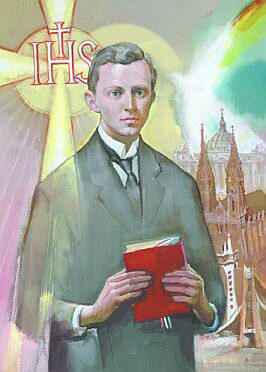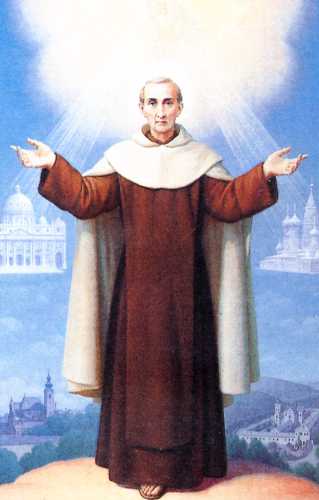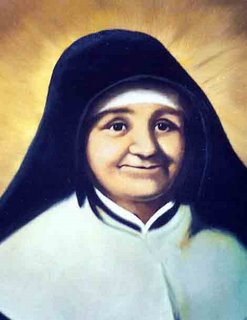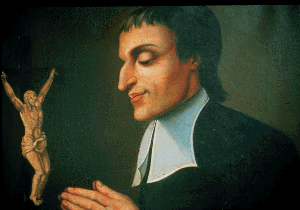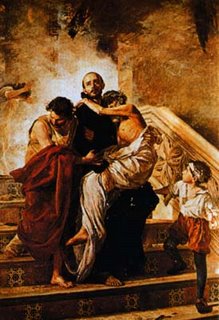
John de Dios was born of a humble couple in the year 1495, though his parents were devout they were also poor. The young John was very taken with stories of adventures far from his native land of Portugal so from a young age John decided to run away from home and explore the excitements of the wider world. This would bring much sorrow to his parents most especially his mother who died not long after John left home, but she was comforted when an Angel appeared to her and told her that though her son would suffer adversity he would lead a good and holy life. John's mother then died a peaceful death.
Upon running away it didn't take John long to have regrets over his actions, for John at first did not find the expected excitement and instead worked as a shepherd in the fields of Spain. Through his hard work he was able to gain the trust of his employer who offered John his daughter to marry, but John declined the offer, as he felt God calling him to another direction entirely. Once he refused the offer of marriage John felt a little uncomfortable so he stowed away in the middle of the night and decided to join the Spanish army in their fight against France. John roamed about for many years not really knowing what to do with his life as he served in the army, and though he was a good soldier and joined in with the antics of his fellow soldiers in the end it failed to deliver the fulfillment that he longed for. Because of Johns inner wranglings his fellow compatriots became annoyed and so tricked John into leaving his post thereby angering the authorities and John subsequently was discharged from serving with them.
Through this internal dialogue within himself John would prove himself to be no ordinary man as he repented deeply of the wrongs he had done in his life most especially the pain he had caused his parents. He decided that he would put things right between himself and his parents and so returned to his native homeland. Upon arriving though John was sorrowful unto death when he discovered that both of his parents had died during his absence this truly tore at the heart of this repentant man and he wept profusely that it was now too late to make amends to his parents. Once again this got John thinking and he decided right there and then to never let an opportunity to do good pass him by, he may have let down his parents, his former employer and the army but John would not let down God.
He returned to work as a shepherd for a short time and it was when he heard of the war with the Moslems that once again John's impetuous heart was set afire and he decided to join those who were opposing this mighty army of the Moors. Once he reached the port of Gibraltar where he had indented to take a ship to Africa he came upon a wealthy family who also had need to leave the area immediately, without too much forethought John decided on the spur of the moment that he would instead become the servant to Count DaSilva. Unfortunately the Count died and the DaSilva family were able to return to Spain. John also returned to Spain, thinking himself a failure yet again.
John's whole life seemed to be one misadventure after another, as he tried to find some meaning to his life by jumping from one thing to another only to find that this was not what he was seeking. It was not so much that he was selfish as in he could not pinpoint the direction for which he felt an internal restlessness and so seemed to flit from one occupation to another in a frenzy of activity in order to fill the emptiness he felt within his soul. This did not make John a bad man nor a flighty one it made him a restless one with no place to call home.
It was while he was at Granada that he heard a sermon delivered by John of Avila, this stirred his heart deeply so much so that through his outward display of his intense feeling of grief over his past sins, John soon found himself locked within an insane asylum. He was visited by John of Avila and finding him to be sane John of Avila instructed John to behave himself and to do something with his life rather than meander on his meaningless trail. This truth truly struck home with John and he promised then and there to do all he could to serve God and the poor.
Upon his release from prison John began collecting all he could for the poor of the area in Granada. This particular work appealed to John in that he also empathized with all he met and did not judge those who found themselves in difficult circumstances. John knew that his own past behaviour did not bare closer scrutiny and though he knew God had forgiven him still he compassionated with those who did not yet understand the deep mercy of God's Love. Johns deep love for the poor was never in doubt and when he heard that a terrible fire had broken out in a nearby hospital John immediately left to do all he could to assist in saving those from the burnt out wreckage. Once he arrived though John was stunned to see many spectators just standing around as they watch the inmates burn, John did not lack courage so he raced into the burning building to save as many lives as he could. This time his impetuous nature not only worked for him it also saved lives.
There were many instances that changed Johns life most especially when he aided a poor beggar who had collapsed and as he bent to kiss the feet of the poor beggar it was here that John noticed he had nail marks driven into his feet. John was full of awe and knelt at the feet of his Lord and Savior. John was to come to the aid of many of the poor and his friends, one especially who had accidentally fallen into a raging river, John with no thought for his own safety jumped in and saved his friends life. It was through this accident that John would become critically ill as he caught pneumonia.
Though John's beginnings seemed to be one long accident after another as he tried desperately to 'fit in' John finally found his calling to serve God through the poor. John found the meaning of his existance through the love of God, and therefore he strove to serve God the rest of his remaining days.
John de Dios died in 1550.
Saint John of God was canonized in 1690 by Pope Alexander VIII.
Some Quotes
"If we look forward to receiving God's mercy, we can never fail to do good so long as we have the strength. For is we share with the poor, out of love for God, whatever he has given to us, we shall receive according to his promise a hundredfold in eternal happiness. What a fine profit, what a blessed reward! With outstretched arms he begs us to turn toward him, to weep for our sins, and to become the servants of love, first for ourselves, then for our neighbors. Just as water extinguishes a fire, so love wipes away sin."
"I work here on borrowed money, a prisoner for the sake of Jesus Christ. And often my debts are so pressing that I dare not go out of the house for fear of being seized by my creditors. Whenever I see so many poor brothers and neighbors of mine suffering beyond their strength and overwhelmed with so many physical or mental ills which I cannot alleviate, then I become exceedingly sorrowful; but I trust in Christ, who knows my heart. And so I say, "Woe to the man who trusts in men rather than in Christ."
"God is Gracious"
Peace of Christ to ALL
Copyright © 2006 Marie Smith. All rights reserved.
